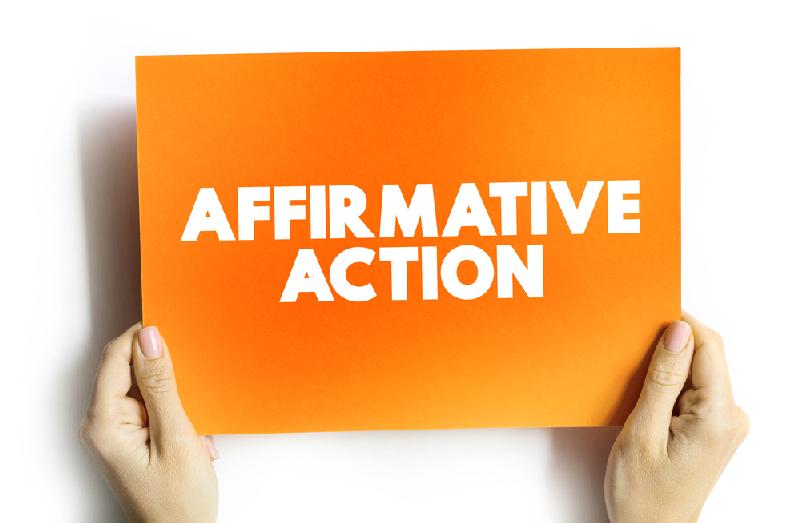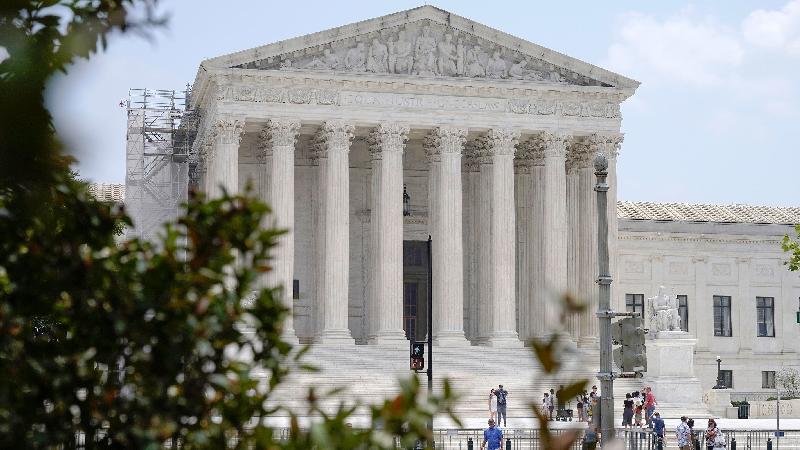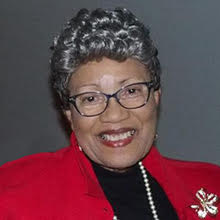
*(CNN) — The Supreme Court says colleges and universities can no longer take race into consideration as a specific basis for granting admission, a landmark decision overturning long-standing precedent that has benefited Black and Latino students in higher education.
Chief Justice John Roberts wrote the opinion for the conservative majority, saying the Harvard and University of North Carolina admissions programs violated the Equal Protection Clause because they failed to offer “measurable” objectives to justify the use of race. He said the programs involve racial stereotyping and had no specific endpoint.
“The Harvard and UNC admissions programs cannot be reconciled with the guarantees of the Equal Protection Clause. Both programs lack sufficiently focused and measurable objectives warranting the use of race, unavoidably employ race in a negative manner, involve racial stereotyping, and lack meaningful endpoints. We have never permitted admissions programs to work in that way, and we will not do so today,” Roberts wrote.
The majority opinion claims that the court was not expressly overturning prior cases authorizing race-based affirmative action and suggested that how race has affected an applicant’s life can still be part of how their application is considered. But even if the court did not formally end race-based affirmative action in higher education, its analysis will make it practically impossible for colleges and universities to take race into account – as the three Democratic appointees stressed in dissent.
In a lengthy concurrence, Justice Clarence Thomas, the second Black person to join the Supreme Court, spoke in unusually personal terms as he criticized the use of affirmative action policies by colleges and universities, which he described as “rudderless, race-based preferences designed to ensure a particular racial mix in their entering classes.”
Strong dissents
“While I am painfully aware of the social and economic ravages which have befallen my race and all who suffer discrimination, I hold out enduring hope that this country will live up to its principles so clearly enunciated in the Declaration of Independence and the Constitution of the United States: that all men are created equal, are equal citizens, and must be treated equally before the law,” Thomas wrote.
Justice Sonia Sotomayor, joined by Justice Elena Kagan and Ketanji Brown Jackson, issued a fiery dissent, saying the opinion “rolls back decades of precedent and momentous progress.”
“The result of today’s decision is that a person’s skin color may play a role in assessing individualized suspicion, but it cannot play a role in assessing that person’s individualized contributions to a diverse learning environment,” Sotomayor wrote. “That indefensible reading of the Constitution is not grounded in law and subverts the Fourteenth Amendment’s guarantee of equal protection.”
In a demonstration of the controversial nature of the case, justices read their dissents from the bench for the first time since 2019.
“The devastating impact of this decision cannot be overstated,” Sotomayor said while reading a synopsis from the bench.
In ending her dissent, Sotomayor quoted Dr. Martin Luther King attempting to end the opinion on an optimistic note.
“As has been the case before in the history of American democracy, ‘the arc of the moral universe’ will bend toward racial justice despite the Court’s effort to impede its progress,” she said. Sotomayor pointedly did not use the customary language “I respectfully dissent.”
In her own dissent, Jackson, the only Black woman on the bench, accused the majority of having a “let-them-eat-cake obliviousness” in how the ruling announced, “‘colorblindness for all’ by legal fiat.”
“But deeming race irrelevant in law does not make it so in life,” she said, joined by the court’s two other liberals.
Jackson wrote that the majority had “detached itself from this country’s actual past and present experiences.”
“No one benefits from ignorance,” she added.
US military service academies are exempted from ruling
The ruling says that US military service academies can continue to take race into consideration as a factor in admissions.
In a footnote in the majority opinion, Roberts said that the cases before the court did “not address the issue” and left open the possibility that there are “potentially distinct interests that military academies may present” in a future case.
During oral arguments, Solicitor General Elizabeth Prelogar stressed the unique interests of the military and argued that race-based admissions programs further the nation’s compelling interest of diversity.
Jackson called out the caveat in her dissent.
“The court has come to rest on the bottom-line conclusion that racial diversity in higher education is only worth potentially preserving insofar as it might be needed to prepare Black Americans and other underrepresented minorities for success in the bunker, not the boardroom (a particularly awkward place to land, in light of the history the majority opts to ignore),” Jackson wrote.
GOP celebrates as Democrats blast the court
House Speaker Kevin McCarthy hailed the affirmative action decision, saying that the justices “just ruled that no American should be denied educational opportunities because of race.” And Republican Sen. Ted Cruz, who sits on the Senate Judiciary Committee, said in a statement, “This is a great day for all Americans.”
Former President Donald Trump called Thursday a “great day for America.”
“People with extraordinary ability and everything else necessary for success, including future greatness for our country, are finally being rewarded,” Trump said on Truth Social. “This is the ruling everyone was waiting and hoping for and the result was amazing.”
Trump transformed the court when he nominated three of the justices in the conservative majority.
Another 2024 GOP contender, former Vice President Mike Pence, also celebrated the ruling.
“There is no place for discrimination based on race in the United States, and I am pleased that the Supreme Court has put an end to this egregious violation of civil and constitutional rights in admissions processes, which only served to perpetuate racism,” Pence said.
Senate Majority Leader Chuck Schumer called the Supreme Court affirmative action ruling “a giant roadblock in our country’s march toward racial justice.”
“The consequences of this decision will be felt immediately and across the country, as students of color will face an admission cycle next year with fewer opportunities to attend the same colleges and universities than their parents and older siblings,” the New York Democrat said.
Legal fights will continue
CNN Chief Legal Analyst Laura Coates said the Supreme Court’s decision will have sweeping changes to education in the US.
“This opinion, make no mistake about it, it is going to change the landscape of education, and this is what the majority has asked for,” she said.
Steve Vladeck, CNN Supreme Court analyst and professor at the University of Texas School of Law, said the decision will still not end the legal fight over college admissions.
“In those states that have already banned racial preferences and gone after diversity statements and other softer uses of race in admissions, the decision is going to make it virtually impossible for colleges and universities to take race into account in any specific admissions decision,” Vladeck said.
“But in states that continue to permit colleges and universities to take race into account, we’ll surely see efforts to encourage the kinds of uses the majority does not expressly disavow –whether in diversity statements or elsewhere – and litigation challenging those efforts as being inconsistent with the spirit, if not the letter, of today’s decision.”
Long fight to end affirmative action
Challengers in the case targeted Harvard and the University of North Carolina, arguing that their programs violate equal protection principles, dashed the promise of a colorblind society and discriminated against Asian Americans. They asked the court to overturn the precedent and insist that higher education should explore and further develop race-neutral alternatives to achieve diversity.
A conservative group, Students for Fair Admissions was behind both challenges.
SSFA argued the UNC and Harvard policies violated Title VI of the 1964 Civil Rights Act which prohibits schools receiving federal funds from discriminating based on race as well. The lawyers also argued that the UNC violated the 14th Amendment’s guarantee of equal protection under the law, which covers state universities.
Lower US courts had ruled in favor of the schools, finding that the programs used race in a sufficiently limited way to fulfill a compelling interest in diversity.
After an eight-day trial in 2020, District Court Judge Loretta C. Biggs of the US District Court for the Middle District of North Carolina ruled in favor of the school, making special mention of its history steeped in racism.
“The University continues to face challenges admitting and enrolling underrepresented minorities particularly African American males, Hispanics, and Native Americans,” Biggs said, adding that in 2013 enrollment of Black men in the first-year class fell below 100 students.
The Supreme Court stepped in to consider the case before it was heard by a federal appeals court.
Harvard’s program is like that of the University of North Carolina, but the challenge focused particularly on the treatment of Asian American students and a charge that the school intentionally discriminates against them by setting higher standards for their admission. While Harvard is a private university, it is still subject to Title VI because it receives public funds.
Its freshman class in 2019 had 1,600 students out of 35,000 applicants. Of the 35,000, 2,700 had perfect verbal SAT scores, 3,400 had perfect math SAT scores and more than 8,000 had perfect grade point averages. After a 15-day bench trial that featured thirty witnesses, the district court ruled in favor of Harvard, finding that the school did not discriminate against Asian Americans in violation of Title VI.
The 1st US Circuit Court of Appeals affirmed the district court holding that it did “not clearly err in finding that Harvard did not intentionally discriminate against Asian Americans. ”
The admissions process at the school takes into consideration several components including pre-application recruitment efforts, applications, a “first read” of application materials, and interviews. The reading procedures include guidelines to assign numerical numbers to certain categories to detail the factors admissions officers should consider. Those factors include academic ratings, extracurricular ratings, athletic ratings, and personal ratings.
The personal ratings attempt to measure how an applicant impacts the people around them and the contributions they might make. Considerations include perceived leadership, maturity, self-confidence, likeability, courage, and kindness. After SFFA brought the suit, Harvard modified its instructions to say that an applicant’s race or ethnicity should not be considered in assigning personal ratings. Harvard has a list of so-called “tip” factors, including race, that are used after the first reading process.
Cameron T. Norris, the SSFA lawyer who argued the Harvard case, charged the school with ignoring precedent and the “mistreatment” of Asian-American applicants. “Its admissions process penalizes them for supposedly lacking as much leadership, confidence likability, or kindness as White applicants,” he said, and said that Harvard “engages in admitted racial balancing and ignores race-neutral alternatives.”
He particularly attacked Harvard’s system based on so-called “personal ratings.” By considering race alongside subjective criteria like “self-confidence, likability, and courage,” universities invite admissions officers to rely on anti-Asian stereotypes, Norris added.
Prelogar supported both Harvard and the University of North Carolina, urging the justices to reject the invitation to ignore court precedent stemming from the Court’s 1978 decision in Regents of the University of California v. Bakke, where Justice Lewis F. Powell Jr. recognized that the nation’s future “depends upon leaders trained through wide exposure to the ideas and mores of students as diverse as this Nation of many peoples.”
This story has been updated with additional developments.
MORE ON EURTHISNTHAT: Carl Douglas Makes History as First African American Inducted into the Consumer Attorneys Association of Los Angeles (CAALA) Hall of Fame
The-CNN-Wire
™ & © 2023 Cable News Network, Inc., a Warner Bros. Discovery Company. All rights reserved.





Recent Comments